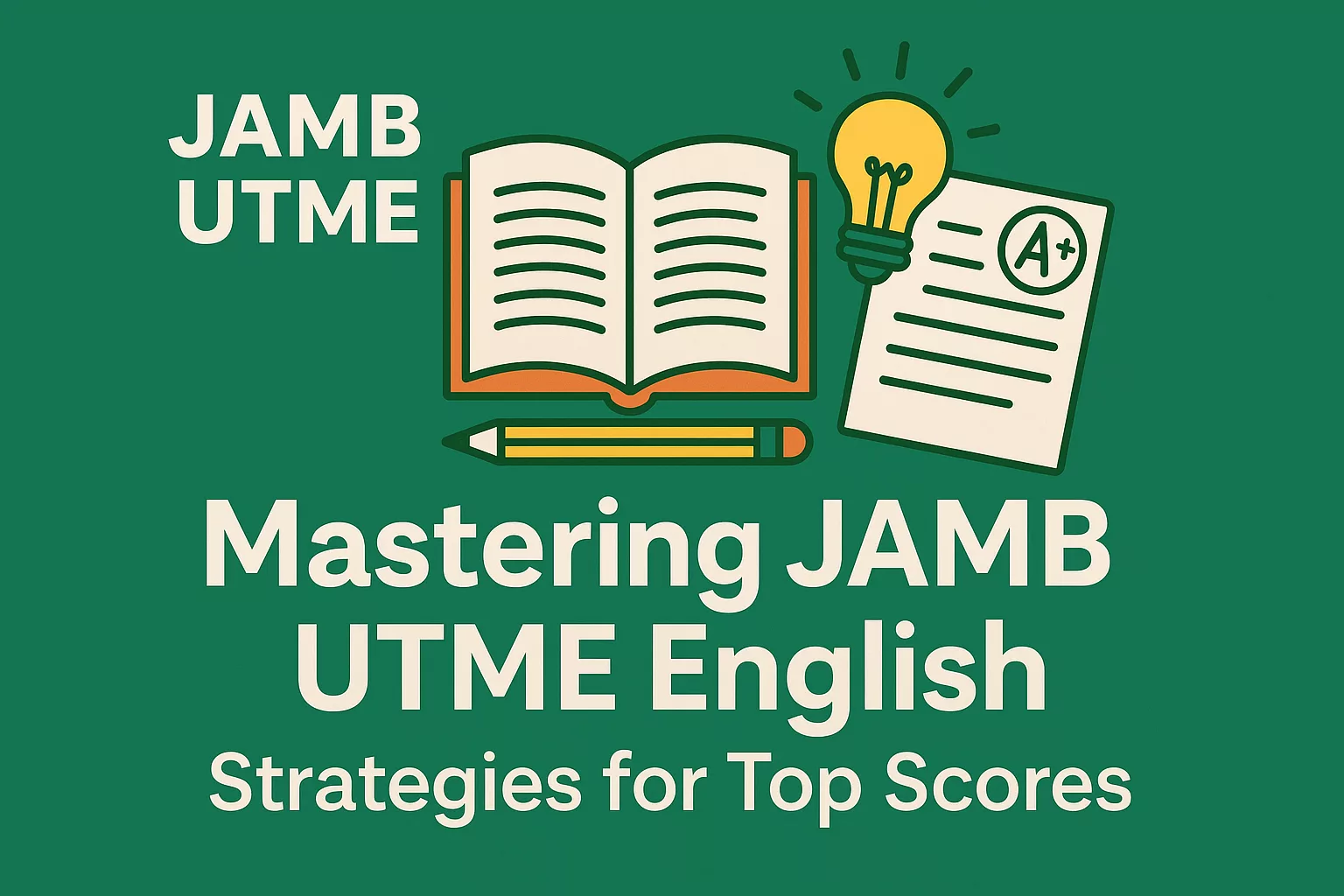1. Introduction
With over a million candidates writing the UTME each year, JAMB English often separates top performers from the rest. A strong command of English boosts not only your overall score but sharpens comprehension across all subjects. In this guide, we’ll explore proven techniques to conquer comprehension passages, vocabulary, grammar, and essay writing under exam conditions.
We begin by examining the structure of the English paper, then dive deep into each component, share time‑management hacks, and recommend quality resources. Whether you’re aiming for a score above 75 or simply wish to avoid common pitfalls, this article equips you with a step‑by‑step pathway.
By following a structured study plan, honing active reading skills, and practicing strategically, you’ll transform challenges into opportunities. Let’s embark on this journey toward UTME English mastery.
2. Deep Dive: Component Breakdown
2.1 Comprehension Passages
- Types of Passages: Narrative, argumentative, descriptive, technical.
- Active Reading: Annotate keywords, summarize paragraphs in margins, predict questions.
- Question Types: Main idea, inference, vocabulary in context, tone, writer’s purpose.
- Technique: Read the questions first (skim), then read the passage for answers; avoid re‑reading excessively.
Practice Drill
- Underline transition words (however, moreover, consequently).
- Note contrasting ideas to tackle inference questions.
- Time yourself: 5 minutes per 250‑word passage, answering all questions.
2.2 Vocabulary and Usage
- High‑Frequency Lists: Compile 300–500 common UTME words from past questions.
- Learning Methods: Spaced repetition (flashcards), mnemonics, contextual reading.
- Question Types: Synonyms/antonyms, fill‑in‑the‑blank (cloze), definitions.
Mini‑Lesson: Building Word Maps
- Choose a target word (e.g., ameliorate).
- List synonyms, antonyms, example sentences.
- Connect to root words (melior = better).
- Review weekly, testing both written and oral recall.
2.3 Grammar and Structure
- Common Topics: Subject‑verb agreement, tense consistency, parallelism, modifiers, pronoun reference.
- Error Spotting: Circle verbs/nouns first, check agreement, read aloud to catch awkward phrasing.
- Sentence Correction Tips: Identify the part underlined; isolate clauses; apply rule checklist.
Rule Checklist
| Topic | Key Rule | Example |
|---|---|---|
| Subject‑Verb Agreement | Singular subject → singular verb | “Each student is ready.” |
| Modifier Placement | Modify nearest word | “She almost failed the test.” |
| Parallelism | Maintain structure in lists/phrases | “He likes reading, writing, and running.” |
3. Exam Strategy Tips
3.1 Time Management
- Section Timing: 40 minutes for comprehension; 20 minutes for cloze & usage; 30 minutes for essay.
- Reading Order: Tackle comprehension first, then vocabulary, grammar, and essay last.
- Buffer Time: Reserve final 10 minutes for review and catching slip‑ups.
3.2 Question Analysis
- Keywords: Circle what the question asks (e.g., “main idea,” “best title”).
- Answer Elimination: Cross out choices that contradict the passage or rule.
- Educated Guessing: When uncertain, eliminate two options; choose the most defensible.
3.3 Stress‑Reduction Techniques
- Deep Breathing: 4‑seconds inhale, 6‑seconds exhale before each section.
- Positive Self‑Talk: “I’ve practiced this; I know my strategies.”
- Focus Anchor: Use a small drawable in margins to recenter if anxiety spikes.
4. Subject‑Specific Overview
4.1 Comprehension Skills
- Inference vs Fact: Look for direct statements for factual questions; for inference, rely on implied meanings.
- Tone & Style: Pay attention to diction (formal/informal), rhetorical devices (irony, hyperbole).
4.2 Cloze Test Mastery
- Grammar Clues: Tense, subject‑verb agreement, pronoun reference.
- Logical Flow: Transitional words guide blank choices (“However,” “Therefore”).
4.3 Essay Writing Essentials
- Essay Types: Argumentative, expository, narrative.
- Structure:
- Introduction: Hook + Thesis statement.
- Body: Three paragraphs; each with topic sentence, evidence, explanation.
- Conclusion: Restate thesis; call to broader significance.
- Language Tips: Vary sentence length; use formal vocabulary; avoid contractions.
Sample Thesis Statements
- Argumentative: “While technology connects global communities, it also fosters isolation by reducing face‑to‑face interaction.”
- Expository: “Community service cultivates responsibility, leadership, and empathy among youth.”
5. Practice & Resources
5.1 Past Question Banks
- JAMB CBT Past Questions Vol. 1–5
- TopGrade Nigeria Comprehension Sets
5.2 Online Platforms
| Platform | Features | Cost |
|---|---|---|
| PrepClass | Live tutoring, timed quizzes | Free–₦5k |
| JAMB Portal | Official CBT interface practice | Free |
| Quizlet | User‑generated flashcards | Free/Premium |
5.3 Mobile Apps
- English Grammar in Use (Cambridge) grammar drills.
- Vocabulary Builder (TOEFL) adaptive word lists.
5.4 Mock Exams & Simulations
- Schedule 2 full‑length mocks in final month.
- Review with peers; simulate exam hall conditions.
6. Conclusion
Mastering JAMB UTME English hinges on strategic practice, active reading, and exam‑smart tactics. By dissecting comprehension passages, expanding your vocabulary, solidifying grammar rules, and refining essay structure, you’ll approach the exam with confidence and clarity.
Commit to a balanced study routine: allocate daily slots for reading, writing, and timed drills. Track your progress, analyze your mistakes, and adjust your approach accordingly. With dedication and the strategies outlined here, targeting a score above 80 becomes entirely within reach.
Take action today: choose one comprehension passage, one vocabulary lesson, and one grammar topic. Apply these methods, and watch your proficiency and UTME score soar.
Good luck!
